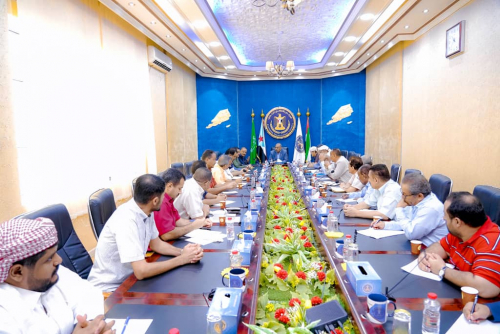President Al-Zubaidi: The Liberation of Hadramaut Coast will Remain an Exceptional Event in the History of People of the South
President Aidarous Qassem Al-Zubaidi, President of the Southern Transitional Council (STC), Supreme...
The President of the Southern Transitional Council, President Aidarous Qassem Al-Zubaidi, held today, Wednesday, in the capital, Aden, an important meeting with the Economic Committee and the Southern Money Exchangers Association.
The meeting was attended by the economic advisor to President Al-Zubaidi, the Minister of Transport in the parity government, Dr. Abdul Salam Humaid, and the director of security for the capital, Aden, Major General Mutahar Al-Shuaibi, in which President Al-Zubaidi welcomed all the attendees, stressing that this consultative meeting is important to discuss possible ways to be taken to stop the continuous deterioration of the value of the local currency, stressing the importance of controlling the exchange rate, which leads to economic deterioration and directly affects the living of citizens.
In turn, Dr. Abdul Salam Humaid, confirmed that the transfer of the Central Bank had a counterproductive result that disappointed what was hoped for, as it was satisfied with printing paper currency and disbursing the salaries, noting that more than three quarters of the monetary mass is in the hands of merchants, in addition to the lack of confidence in the Central Bank.
Humaid explained that the decision to float the currency was one of the reasons for the collapse, presenting four important points that would contribute to stopping the deterioration in the value of the currency, foremost of which is solving the problem of currency floating, and making strong reforms in the bank, solving the problem of branches in Aden and the center in Sana'a, and determining levels of indicative for exchange rate.
For his part, the director of the security of the capital, Aden, Major General Mutahar Al-Shuaibi, urged first the necessity of moral solidarity, noting that the danger would permeate everyone, including the money exchangers.
Major General Mutahar presented a proposal to determine the exchange rate, stressing that the security services in the capital, Aden, will work to follow it up and to implement it.
In turn, the members of the Economic Committee said: “The supply of currency is existed, and the demand for it needs to be rationalized,” noting that the banks in the capital, Aden, are out of effect and that the Central Bank is unable to control the branches, and that it is necessary to control the exchange branches and impose supervision on them.
They pointed out that the government went to raise US dollar exchange rate value for customs, while it was better to determine the purchase cost, expressing their fear of the no-standardized customs duties from one port to another.
They stressed that the currency’s rise does not stop at the economic aspect alone, but rather the political aspect has a role too, noting that there are exceptions to the value-added for some traders, which amounted to about 70 billion Yemeni riyals, and a decision has been issued to invalidate them, and that the guarantee checks are often postponed and making discount on them.
After that, the money exchangers talked about some of the issues and problems that caused the currency's rise and deterioration, noting that they were not the reason for this and that the reason was mainly political.
They stressed the difficulty of determining the exchange rate, because it is linked to supply and demand, and that the currency is withdrawn from the capital, Aden, to Sana'a and some governorates of the South, noting that they are with any reasonable decision regarding setting the currency rate value.
They pointed out that the mistakes of the Central Bank are being thrown at them, although they have a hand in raising the currency and the speed of speculation with it, stressing that the currency in the capital, Aden, can cover basic materials, but there is smuggling of currency abroad and to other governorates, and smuggling must be controlled.
In conclusion, the meeting came up with a set of proposals centered on the necessity of issuing a decision from the Southern Transitional Council to determine the exchange rate value after another meeting or a workshop whose outputs will be binding, and turn into decisions implemented by the Southern Transitional Council on the ground, in addition to basic commodities and oil being through the Central Bank, besides, it is necessary to control the exchange rate in the governorates of the South, and to impose control over the transfer and smuggling of funds abroad and to the north, as well as controlling traders.
The meeting also stressed the need to stop the payment of salaries and any expenses from the South to the north, because they receive and do not reimburse, in addition to canceling the flotation decision and setting the exchange rate, as well as the necessity of the presence of executives of exchange companies at the next meeting and those who fail to take appropriate measures against them.
